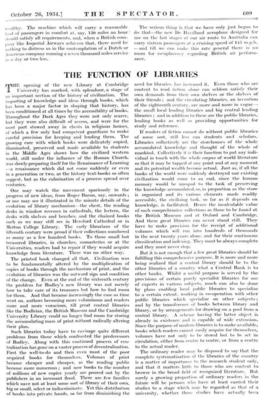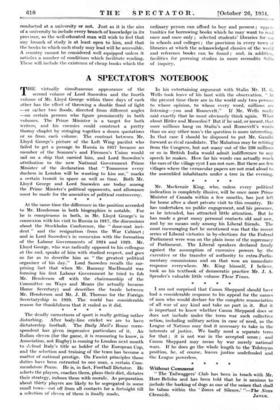THE FUNCTION OF LIBRARIES
THE opening of the new Library at Cambridge University has marked, with splendour, a stage of an important section of the history of civilization. The imparting of knowledge and ideas through books, which has been a major factor in shaping that history, has been conditioned at all times by the accessibility of books. Throughout the Dark Ages they were not only scarce, but they were also difficult of access, and were for the most part stowed away in chests in religious houses, of which a few only had competent guardians to make careful provision for keeping and lending them. The growing care with which books were delicately copied, illuminated, preserved and made available to students in the Middle Ages shows how the civilized western world, still under the influence of the .Roman Church, was slowly preparing itself for the Renaissance of Learning —a renaissance which did not come suddenly or even in a generation or two, as the history text-books so often suggest, but as the culmination of a process spread over centuries.
One may watch the movement spaciously in the progress of new ideas, from Roger Bacon, say, onwards ; or one may see it illustrated in the minute details of the evolution of library mechanism—the chest, the reading desks in window recesses in cathedrals, the lectern, the desks with shelves and benches, and the chained books such as we may still see in Hereford Cathedral or in Merton College Library. The early librarians of the fifteenth century were proud if their collections numbered as many as a few hundred books. To those small but treasured libraries, in churches, monasteries or at the Universities; readers had to repair if they would acquire knowledge from literature. There was no other way.
The printed book changed all that. Civilization was to be fundamentally altered by the multiplication of copies of books through the mechanism of print, and the evolution of libraries was the outward sign and condition of the change. Even at the end of the sixteenth century the problem for Bodley's new library was not merely how to take care of its treasures but how to find room for them. And that became increasingly the case as time went on, authors becoming more voluminous and readers more and more voracious, till great central libraries like the Bodleian, the British Museum and‘the Cambridge University Library could no longer find room for storing the accumulating mass of print without radically altering their plan.
Such libraries today have to envisage quite different problems from those which confronted the predecessors of BOdley. Along with this continued process of cen- tralization has gone on a vaster process of decentralization. First the well-to-do and then even most of the poor acquired books for themselves. Volumes of print became cheaper and cheaper, as the reading public became more numerous ; and now books to the number of millions of new copies yearly are poured out by the publishers in an incessant flood. There are few families which uave not at least some sort of library of their own, big or small, select or indiscriminate. Yet this diStribution of books into private hands, sa far from diminiShing the need for libraries, has increased it. Even those who are content to read fiction alone can seldom satisfy their own demands from their own shelves or the shelves of their friends ; and the circulating libraries, an invention of the eighteenth century. are more and more in vogue— the small local lending libraries and big central lending libraries ; and in addition to these are the public libraries, lending books as well as providing opportunities for study and reference.
If readers of fiction cannot do without public libraries' of some sort,. still less can students and scholars.' Libraries collectively are the storehouses of the whole'• accumulated knowledge and thought of the whole of mankind. Collectively it is their function to put any indi- vidual in touch with the whole corpus of world literature so that it may be tapped at any point and at any moment and its potential wealth become actual. Just as, if all the books of the world were suddenly destroyed our existing civilization would come to an end, since the human memory would be unequal to the task of preserving the knowledge accumulated, so, in proportion as the store is organized and its various elements made readily accessible, the civilizing task, so far as it depends on knowledge, is facilitated. Hence the incalculable value of such comprehensive collections as those to be found at the British Museum and at Oxford and Cambridge. And. these great libraries can never stand still. They have to Make provision for the receipt- of additional volumes which will run into hundreds of thousands in the next twenty years alone, and for their continuous classification and indexing. They must be always complete and they must never stop.
But it is not enough that a few great libraries should be fulfilling this comprehensive purpose. It is more and more being realized that a central library should be to the other libraries of a country what a Central Bank is to other banks. Whilst a useful purpose is served by the provisions of certain purely specialist libraries for use of experts in various subjects, much can also be done by plans enabling local public libraries to specialize to a certain extent, working in co-operation with other public libraries which specialize on other subjects ; and by the transference of books between library and library, or by arrangements for drawing on a pool from a central library. A scheme having the latter object is already in existence and is capable of wide extension. Since the purpose of modern libraries is to make available, books which readers cannot easily acquire for themselves, volumes have not only to be stored but to be set in circulation, either from centre to centre, or from a centre to the actual reader.
The ordinary reader may be disposed to say that the complete systematization of the libraries of the country is a matter of importance to the research student only, and that it matters little to those who are content to browse in the broad field of recognized literature. But surely a growing proportion of ordinary readers in the future will be persons who have at least carried their studies to a stage which may be regarded as that of a university, - whether those studies have actually been conducted at a university or not. Just as it is the aim of a university to include every branch of knowledge in its province, so the well-educated man will wish to feel that any branch of study is at least open to him, and that the books to which such study may lead will be accessible. A country cannot be considered well equipped unless it satisfies a number of conditions which facilitate reading. These will include the existence of cheap books which the ordinary person can afford to buy and possess ; oppor- tunities for borrowing books which he may want to read once and once only ; selected students' libraries for use in schools and colleges ; the provision in every town of libraries at which the acknowledged classics of the world and reference books can be found ; and, in addition, facilities for pursuing studies in more recondite fields of inquiry.























































 Previous page
Previous page